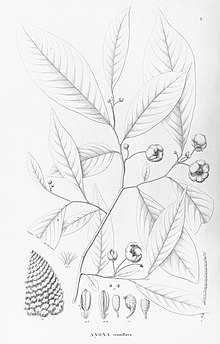Annona tenuiflora is a species of plant in the family Annonaceae. It is native to Brazil, Colombia, French Guiana and Venezuela.[2] Carl Friedrich Philipp von Martius, the German botanist who first formally described the species, named it after the slender (tenui- in Latin) sepals and petals of its flowers.[3][4]
| Annona tenuiflora | |
|---|---|

| |
| Botanical illustration of Annona tenuiflora | |
| Scientific classification | |
| Kingdom: | Plantae |
| Clade: | Tracheophytes |
| Clade: | Angiosperms |
| Clade: | Magnoliids |
| Order: | Magnoliales |
| Family: | Annonaceae |
| Genus: | Annona |
| Species: | A. tenuiflora
|
| Binomial name | |
| Annona tenuiflora | |
| Synonyms | |
|
Raimondia tenuiflora (Mart.) R.E.Fr. | |
Description
editIt is a tree that reaches greater than 9.75 meters in height. Its leaves are 5.4-27 centimeters by 2.7-10.8 and have rounded tips. The leaves have a reddish underside and slightly wavy margins. Its peduncles are 2.7 - 4.1 centimeters long. Carl von Martius conjectured that it has male and female flowers. Its sepals are 2.25 millimeters long. Its flowers have 6 petals in two rows of three. Its pink, concave, oval petals are 1.8 centimeters long. It has numerous tightly packed stamens with hairs at their base, arranged on a conical receptacle. Its anthers are pink.[4]
Reproductive biology
editThe pollen of A. tenuiflora is shed as permanent tetrads.[5]
Habitat and distribution
editIt has been observed in woodland habitats.[4]
Uses
editIt has been reported to be used to treat headache, dizziness and hypotension.[6]
References
edit- ^ Verspagen, N.; Erkens, R.H.J.; Hills, R. (2021). "Annona tenuiflora". IUCN Red List of Threatened Species. 2021: e.T142423146A197675999. doi:10.2305/IUCN.UK.2021-3.RLTS.T142423146A197675999.en. Retrieved 20 June 2022.
- ^ "Annona tenuiflora Mart". Plants of the World Online. The Trustees of the Royal Botanic Gardens, Kew. n.d. Retrieved January 5, 2019.
- ^ Stearn, William (2004). Botanical Latin. Portland, Ore. Newton Abbot: Timber Press David & Charles. ISBN 9780881926279.
- ^ a b c von Martius, Carl Friedrich Philipp (1841). "Anonaceae". Flora Brasiliensis (in Latin). Vol. 13. Munich & Leipzig: R. Oldenbourg. p. 13.
- ^ Walker, James W. (1971). "Pollen Morphology, Phytogeography, and Phylogeny of the Annonaceae". Contributions from the Gray Herbarium of Harvard University. 202 (202): 1–130. JSTOR 41764703.
- ^ Lorenzoni, Rodrigo Monte; Rosado, Carla Cristina Gonçalves; Soares, Taís Cristina Bastos (2016). "Chapter 6: Diversidade genética em espécies do gênero Annona L. (Annonaceae)" [Genetic diversity in species of the genus Annona L. (Annonaceae)]. In Ferreira, Adésio; Lopes, José Carlos; Ferreira, Marcia Flores da Silva; Soares, Taís Cristina Bastos (eds.). Tópicos Especiais em Produção Vegetal VI [Special Topics in Plant Production VI] (in Portuguese). CAUFES. p. 151. ISBN 978-85-61890-88-9.
